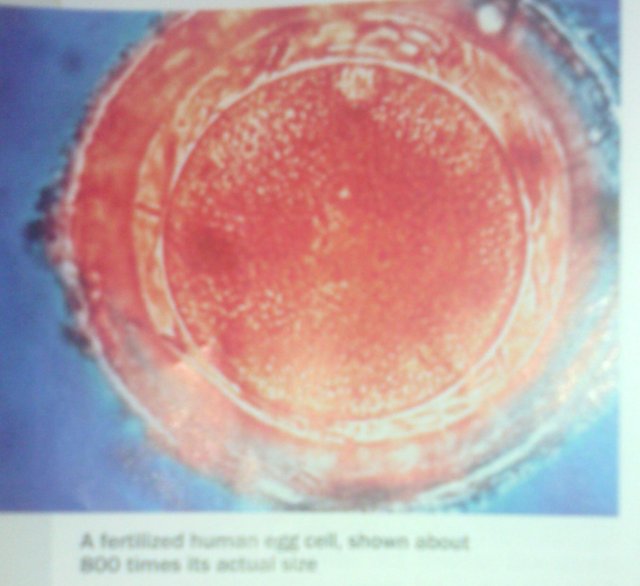HOW DID LIFE BEGIN?

Other equally respected scientists who also support evolution disagree.They speculate that the first cells or at least their major components arrived on earth from outer space.Why?because,despite their best efforts,scientists have unable to prove that life can spring from nonliving molecules.In 2008,Professor of biology. Alexandre Meinesz highlighted the dilemma.He stated that over the last 50 years,"no empirical evidence supports the hypotheses of the spontaneous appearance of life on earth from nothing but a molecular soup,and no significant advance in scientific knowledge Leads in this direction."
What does the evidence reveal?The answer to the question,where do babies come from? is well documented and uncontroversial.Life always comes from preexisting life.However,if we go back far enough in time, is it really possible that this fundamental law was broken? Could life really spontaneously spring from nonliving chemicals? What are the chances that such an event could happen?
Researchers have learned that for a cell to survive, steady three different types of complex molecules must work together-DNA(deoxyribonucleic acid),RNA (ribonucleic acid),and proteins. TODAY, few scientists would assert that a complete living cell suddenly formed by chance from a mix of inanimate chemicals. What, though, is the probability that Email or proteins could form by chance?
Many scientists feel that life could arise by chance because of an experiment first conducted in 1953.In that year, Stanley L.Miller was able to produce some amino acids,the chemicals building block of proteins,by discharging electricity into a mixture of gases that was thought to represent the the atmosphere of primitive earth. Since then,amino acids have also been found in a meteorite.Do these findings mean that all the basic building blocks of life could easily be produced by chance?
Some writers,"says Robert Shapiro,professor emeritus of chemistry at New York University, "have presumed that all life's building blocks could be formed with ease in Miller type experiments and were present in meteorites.This is not the case."
Consider the RNA molecule.It is constructed of smaller molecules called multitudes.A multitude is a different molecule from an amino acid and is only slightly more complex.Shapiro says that no. multitudes of any kind have been rotted as products of spark-discharge experiments or in studies of meteorites. He further states that the probability of a self-replicating RNA molecule randomly assembling from a pool of chemical building blocks "is so vanishingly small that it's happening even once anywhere in the visible universe would count as a piece of exceptional good luck.
What about protein molecules?They. can be made from as few as 50 or as many as several thousand amino acids bound together in a highly specific order.The average functional protein in a "simple"cell contains 200amino acids.Even in those cells,their are thousands of different types of proteins.The probability that just one protein containing only 100 amino acids could ever randomly form on earth has been calculates to be about one chance in million billion.Researcher Hubert P.Yockey, who supports the tacking of evolution, goes further. He says:"It is impossible that the origin of life was protein first."RNA is required to make proteins, yet proteins are involved in the production of RNA.What if,despite the extremely small odds,both proteins and RNA molecules did appear rby chance in the same place at the same time?How likely would it be for them to cooperate to form a self replicating,self sustaining type of life? "The probability of this happening by chance (given a random mixture of proteins and RNA).seems astronomically low,"says Dr.Carol Cleland,a member of the National Aeronautics and space Administrations Astrobiology institute.Yet she continues,"most researchers seem to assume that if they can make sense of the independent production of proteins and RNA under natural primordial conditions, the coordination will some how take care of itself." Regarding the current theories of how these building blocks of life could ha e arisen by chance, she says: "None of them have provided us with a very satisfying Story about how this happen."
Why do these facts matter? Think of the challenge facing researchers who feel that life arouse by chance. They have found some amino acids that also appear in living cells.In their laboratories,They have,by means of carefully designed and directed experiments,manufactured other more complex molecules.Ultimately They hope to build all the parts needed to construct a "simple" cell.Their situation could be likened to that of a scientist who takes naturally occurring elements;transforms them into steel,plastic,silicon,and wire; and constructs a robot. He then programs the Robot to be able to build copies of itself.By doing so,What will He prove? At best,that an intelligent entity can create an impressive machine.
Similarly,if scientists ever did construct a cell,they would accomplish something truly amazing-but would They prove that the cell could be made by accident?If anything,They would prove the very opposite,would they not?
What do you think?All scientific evidence to date indicates that life can come only from previously existing life.

